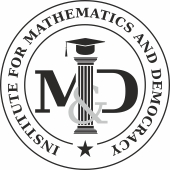It is well-established that quantitative literacy is a necessary ingredient for economic development. However, research and education aimed at improvement of quantitative literacy are usually in the service of technology or data analysis. They emphasize skills that ensure entrepreneurial growth and high-tech innovation.
In the political arena, on the other hand, almost every public issue has an aspect rooted in mathematics. While historical, legal, and theoretical approaches to teaching politics abound in our schools, the quantitative view is rarely presented or even available. Mathematical aspects of topics like voting, apportionment, gerrymandering, or the role of statistics in politics are typically not covered in mathematics, civics, or government classes. A broader context of mathematical social choice theory and game theory is even more glaringly absent.
There are a number of efforts by individuals and organizations dedicated to research or raising awareness about particular topics in the intersection of mathematics and politics. But an institution devoted in a broader way to education, research, and the dissemination of information on the role of mathematics in politics does not appear to exist.
IMD’s activities are designed to remedy these deficiencies. They aim to elevate the awareness and scholarship about the many ways in which mathematics plays a role in democracy. These endeavors are transdisciplinary, drawing from mathematics, statistics, political science, economics, and history. They also serve a social purpose of providing students, researchers, educators, and the general public with the tools to become more knowledgeable participants in democracy.
More on the motivation behind IMD’s creation can be found in this opinion piece by one of our founders.


